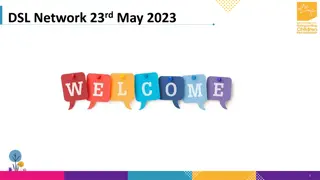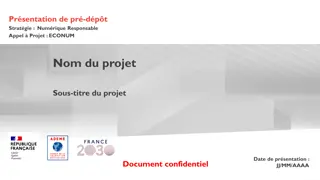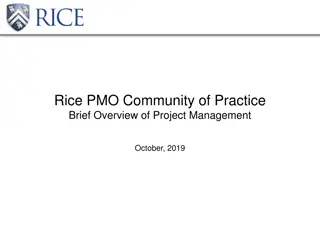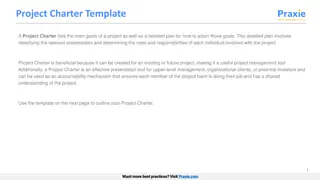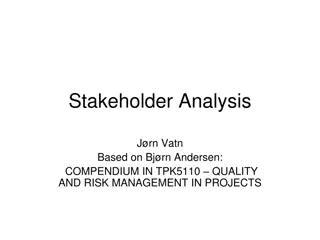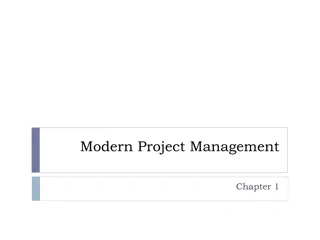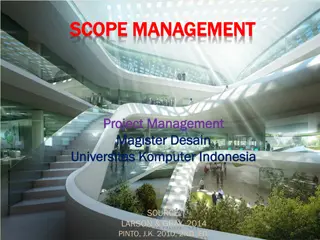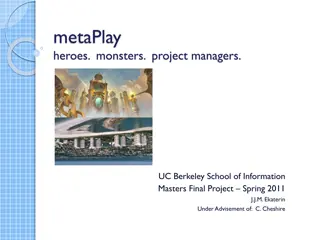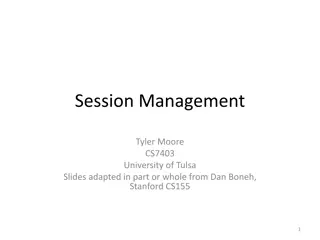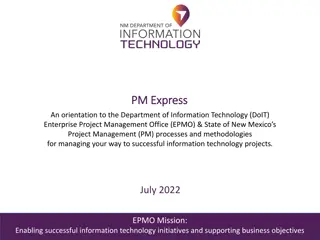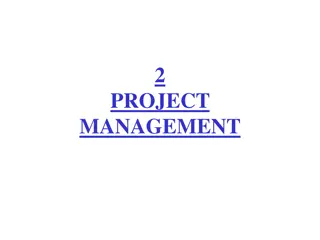
Effective Project Teams and Team Management Strategies
Learn about the characteristics of effective teams, team development stages, roles and responsibilities within a team, reasons for team failure, and strategies for building successful project teams. Explore valuable insights on team development stages based on Tuckman's model and assess your role within a team to enhance collaboration and productivity.
Download Presentation

Please find below an Image/Link to download the presentation.
The content on the website is provided AS IS for your information and personal use only. It may not be sold, licensed, or shared on other websites without obtaining consent from the author. If you encounter any issues during the download, it is possible that the publisher has removed the file from their server.
You are allowed to download the files provided on this website for personal or commercial use, subject to the condition that they are used lawfully. All files are the property of their respective owners.
The content on the website is provided AS IS for your information and personal use only. It may not be sold, licensed, or shared on other websites without obtaining consent from the author.
E N D
Presentation Transcript
2. Project Team and Management 2. Project Team and Management 2.2 Team Management 2.2 Team Management - Roles and Responsibilities of Team Members Roles and Responsibilities of Team Members - Team Development Team Development - Team Roles Team Roles - Teams in Transition Teams in Transition 2 2
Learning Objectives Learning Objectives 1. Be aware of characteristics of effective teams and team development stages 2. Students can explain the functions, strengths, and weaknesses of different team roles and are able to evaluate their own 3. Students reflect their own behaviour in teams 3 3
When When do do teams teams fail fail? ? 1. Think of an example where teamwork failed 2. Share the story with your neighbour 3. Share with the class and try to come up with a generalised guideline 4
Roles Roles and and Responsibilities Responsibilities in Teams in Teams Video 5
Reasons Why Teams Fail Reasons Why Teams Fail Poorly developed or unclear goals Poorly defined project team roles Lack of project team motivation Poor communication communication Poor leadership leadership Turnover Turnover among project team members Dysfunctional Dysfunctional behaviour unclear goals team roles & interdependencies motivation 6
Effective Project Teams Effective Project Teams Clear Sense of Mission Productive Interdependency Results Orientation Enthusiasm Cohesiveness Trust 7
Team Development Stages Team Development Stages Baded on: Tuckman(1965). Picture License CC BY-SA 8
What is your role in a team? What is your role in a team? Assessing Your Team Roles: Now, enter the scores and add up the points to find out your own team role and the team role of your partner Discuss with your partner a) whether the results of the test were what you expected and b) the issue of self- and outside perception. 9
Belbins Belbin s Team Roles Team Roles Team Role: A tendency to behave, contribute, and interrelate with others in a particular way. (Meredith Belbin) http://www.belbin.com 10
Belbins Belbin s Team Roles Team Roles http://www.belbin.com 11
What is your role in a team? Part 2 What is your role in a team? Part 2 Assessing Your Team Roles: Find a partner Fill out the test for assessing team roles (pp. 1-4) for you and for your partner 12
Teams in Transition Teams in Transition International team members working at one place at one time Team members working at one place, at one time International team members working locally dispersed traditional team transnational team multicultural team 13
Managing Transnational Teams Managing Transnational Teams Advantages: Greater opportunity for global competition Opportunities for cross-cultural understanding Exposure to different view points Disadvantages: Problems resulting from differences in languages Complex decision making processes Personality conflicts 14
Virtual Project Teams Virtual Project Teams Uses electronic media to link members of a geographically dispersed project team How Can Virtual Teams Be Improved? Use face-to-face communication when possible Don t let team members disappear Establish a code of conduct Keep everyone in the communication loop Create a process for addressing conflict 15
Review Intercultural Management Review Intercultural Management Which cultural differences have you encountered in student or working groups? Which cultural dimension will influence your team structure? Which cultural dimensions will influence project processes? 16
Quiz Quiz - - Review Review 1. Virtual teams are often slowed down by difficulty establishing: A) Superordinate goals B) Task outcomes C) Trust D) Psychosocial outcomes 2. According to Belbin a plant is: A) A highly creative person B) A perfectionist C) An extrovert and good communicator D) A self-controlled and disciplined person
Review Chapter 1 and 2 Review Chapter 1 and 2 1. What is a project? 2. What is the difference between a process and a project? 3. What are the stages of a project life cycle? 4. Why is project management leader intensive? 5. Which stages is the team undergoing? Remember, a project plan is part of your exam. So, consider starting to assemble your project team now 18
Summary Summary Understand the steps involved in project team building and Know the characteristics of effective project teams and why teams fail Know the stages in the development of groups Understand and reflect your own role on a project team 19 19
Learning Objectives Learning Objectives 1. Be aware of characteristics of effective teams and team development stages 2. Students can explain the functions, strengths, and weaknesses of different team roles and are able to evaluate their own 3. Students reflect their own behaviour in teams 20 20
References References Belbin, R. M. (2012). Team roles at work. Routledge. Dulewicz, V. (1995). A validation of Belbin's team roles from 16PF and OPQ using bosses' ratings of competence. Journal of Occupational and Organizational Psychology, 68(2), 81-99. Pinto, J. K. (2015): Project management. Achieving competitive advantage, Pearson Education, Harlow, Essex, 4thed. Swailes, S., & McIntyre-Bhatty, T. (2002). The Belbin team role inventory: reinterpreting reliability estimates. Journal of Managerial Psychology, 17(6), 529-536. Tuckman, Bruce W (1965): Developmental sequence in small groups. Psychological Bulletin. 63 (6): 384 399. Tuckman, Bruce (Spring 2001). Developmental Sequence in Small Groups. Group Facilitation: A Research and Applications Journal: 71 72. 21

